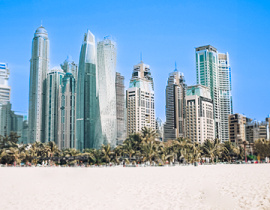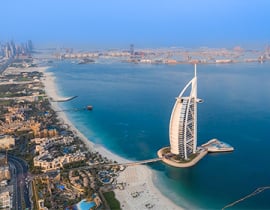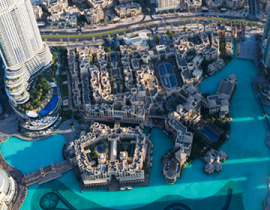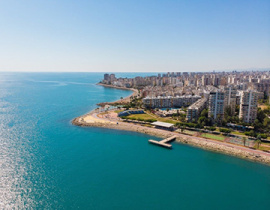- Home
- Blog
- Buying Guide
- Title Deed and Property Ownership in Dubai: A Complete Guide
Title Deed and Property Ownership in Dubai: A Complete Guide
The Dubai Land Department (DLD) is the main authority for real estate ownership transactions. This makes DLD the main channel that can verify and declare the right of ownership in Dubai. The department holds the essential records of properties including title deeds, usufructs, musataha agreements, and long-term leases. However, the Dubai International Financial Centre (DIFC) is an exception. This free zone operates under distinct property laws of itself. It manages a separate registry for real estate within its jurisdiction.
The Property Registration in the Emirate of Dubai determines the property ownership regulations. It covers the composition of ownership for both individuals and companies across Dubai.
Real Estate Ownership in Dubai
Foreigners can buy real estate in Dubai, UAE. Beforehand, expats weren’t allowed to buy real estate in the United Arab Emirates. Eventually, the Dubai government granted expats of all nationalities the opportunity to lease Dubai property. It was the first emirate to do so.
In May 2002, a decree was issued on Dubai property ownership rules regarding foreigners’ real estate purchases. With that regulation, the government permitted foreign nationals to acquire investment property in Dubai under freehold ownership.
Essentially, property ownership has no major restrictions for citizens of UAE and GCC (Gulf Cooperation Council) countries. However, non-GCC and non-UAE nationals are also allowed to own properties in the “designated zones”. These zones are determined by the Ruler of Dubai.
Article 3 of Regulation No. 3 of 2006 Determining Areas for Ownership by Non-Nationals of Real Property in the Emirate of Dubai indicates the land plots designated as freehold properties.
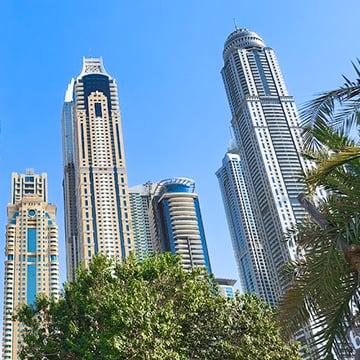 In designated zones, foreigners can buy real estate with absolute ownership rights, without time restrictions. In addition, they have a chance to hold a usufruct or a leasehold property that holds the ownership rights for up to 99 years. Foreigners can also apply for joint ownership in Dubai.
In designated zones, foreigners can buy real estate with absolute ownership rights, without time restrictions. In addition, they have a chance to hold a usufruct or a leasehold property that holds the ownership rights for up to 99 years. Foreigners can also apply for joint ownership in Dubai.
There are two main types of property ownership in Dubai for expats freehold and leasehold.
The leasehold ownership grants holding property rights for a fixed term, typically up to 99 years in Dubai. However, the land on which the property stands remains under the ownership of the freeholder. It is relatively limited when compared to freehold ownership. In leasehold ownership, the leasehold owner might need the approval of the landowner to make certain changes to the property.
Buyers with freehold ownership would be granted complete rights of both the property and the land it occupies. This allows for the property's sale, lease, or occupation at the owner's discretion. The Dubai Land Department registers the freehold buyer as the 'landowner' according to Dubai's property ownership laws. It issues a title deed for the property that grants the ownership indefinitely.
The heirs can inherit the property rights in the case of freehold ownership. This means ensuring the property stays within the family. Owners of freehold property in Dubai and first-degree family members may qualify for renewable UAE residence visas under specific conditions. Freehold property owners may also be eligible for long-term visas in UAE that extend to 5 and 10 years.
Foreign trusts or funds, regardless of whether they are offshore or onshore, are not permitted to hold real estate in Dubai. Foreign offshore companies are currently prohibited from directly owning real estate within the designated zones. However, offshore entities that held property in these zones before this regulation came into force can maintain ownership. They can conduct various real estate transactions such as sales, leases, etc. Nevertheless, they are not permitted to purchase additional properties but only maintain already owned ones.
Similarly, foreign onshore companies are also not allowed to directly own real estate in the Designated Areas. However, they have the option to establish a company within the free zones endorsed by the DLD. They can then go on with their real estate acquisitions under the name of the company they've established in the Dubai free zone.
Designated Zones
The designated areas in Dubai are determined by Regulation No. 3 of 2006. It is called Determining Areas for Ownership by Non-Nationals of Real Property in the Emirate of Dubai. Article 3 of this regulation outlines the designated areas for non-UAE nationals to acquire ownership. The determination of these designated areas is under the command of the Ruler of Dubai.
The following is a compilation of some key designated areas:
| Palm Jumeirah | Business Bay | Dubai Marina | Jumeirah Islands & Village |
| The World Islands | Jumeirah Lake Towers | Jumeirah Beach Residence | Discovery Gardens |
| Downtown Dubai | Arabian Ranches | Midriff (Specified Plots) | Dubai Investment Park |
| Old Town | Emirates Hills | Falcon City | Dubai Sports City |
| Burj Khalifa | International City | Dubai Motor City | Al Sofouh 1 & 2 |
Title Deeds in Dubai
Title deeds are issued, granted, and can be verified by the Dubai Land Department. The title deed includes the main information about the property and the owner. It consists of details like ownership type and number of properties acquired. There is also detailed information like the property’s size, exact location description by the plot, and building number. The title deed also includes the names of the owners and their shares. The number and date of registration, the property purchasing price, and the certificate number can also be found in the title deed.
There are a few types of title deeds in Dubai.
Title Deed (Ejari) is the standard title deed of freehold properties. Ejari is granted when buyers purchase a finished property from the developer directly. This formal title deed is registered in the owner’s name immediately.
.jpg) Oqood is granted for off-plan properties while it is still in the project development stage. This official document assigned the buyer as the registered owner of the real estate. After construction is finished, the Oqood seamlessly transitions into a regular title deed. It holds a distinct title deed number in compliance with Dubai’s real estate laws.
Oqood is granted for off-plan properties while it is still in the project development stage. This official document assigned the buyer as the registered owner of the real estate. After construction is finished, the Oqood seamlessly transitions into a regular title deed. It holds a distinct title deed number in compliance with Dubai’s real estate laws.
Usufruct title deed is a prolonged lease agreement. Usufruct properties come with specific limitations. Lease durations for usufruct properties typically span from 10 to 99 years for residential properties. It is limited to 50 years for commercial properties. The rights of usufructuary deeds are declared in Articles 1333 and 1348 of the UAE Civil Code.
There are other leasehold title deeds that grant fractional ownership of real estate for a limited time. For example, Musataha deeds are issued to possess units for a renewable 50-year period. It is given to utilize, construct, or modify the property within the given timeframe. Article 1353 of the Civil Code defines the general framework of Musataha agreements. The Musataha rights work along the same lines as usufructuary rights, except that they allow the owner to modify the property.
Mulkiya deeds are specific documents that are issued for inherited properties. This title deed outlines the inheritance ownership rights according to the inheritance laws.
Short and long-term lease deeds are for fixed-term leases. The long-term lease spans no less than 25 years, while short-term leases can last up to 10 years maximum.
Step-by-Step Title Deed Transfer in Dubai
There are five main steps of title deed acquisition in Dubai. The first step is to find the real estate to buy in Dubai and attend the viewing tour. The second step is to pay the deposit amount and sign a contract with the seller. The third step is to obtain a “No-Objection Certificate (NOC)” from the developer and gather other documents. The fourth step is to attend the appointment in the Dubai Land Department to submit the documents. The last step is to get the title deed verified and issued by the DLD.
Step 1: Find the right property
The first step is to analyze the wishes and purchasing motivation to find the most suitable real estate among Dubai’s dazzling skyline of luxury projects. The whole city has a plethora of state-of-the-art projects and high-end real estate options. From this time on, it is highly recommended to work with an experienced team like TEKCE. This team of professionals can guide you to the most convenient properties. They can also present to you exclusive offers, thanks to their in-depth market knowledge.
Step 2: Pay the deposit and sign the sales agreement
After choosing the right property to buy in the viewing tour, the next step is to pay the deposit and sign a sales agreement. This agreement will determine the terms of the sale. The document must be signed by both buyer and seller. The sales contract is a necessary document to complete the title deed transfer.
Step 3: Get a “No Objection Certificate” and other documents
.jpg) No Objection Certificate (NOC) is a legal document. It confirms that the property is open for the title deed transfer and there are no encumbrances on the property. This certificate claims that all charges and dues associated with the real estate to be bought have been taken care of. It declares that there are no restrictions that can affect the property’s ongoing sale process.
No Objection Certificate (NOC) is a legal document. It confirms that the property is open for the title deed transfer and there are no encumbrances on the property. This certificate claims that all charges and dues associated with the real estate to be bought have been taken care of. It declares that there are no restrictions that can affect the property’s ongoing sale process.
There are also other documents to gather for the property transaction. The most essential documents are; a valid passport, residence permit if there is one, proof of income and sufficient funds such as payroll and bank statements, and current address information. The necessary documents might change depending on the sales agreement and conditions.
Step 4: Complete title deed transactions at the DLD
At this step, the buyer will make an appointment with the Dubai Land Department (DLD) to finalize the title deed transfer. The registration fees and administrative charges must be paid. After everything checks out, the DLD verifies documents, completes transactions, and grants the ownership rights to the buyer.
Step 5: Get the issued title deed
After the title deed is issued by the DLD, it will be shipped directly to the owner’s stated address. The title deed is issued within 30 days. Until then, the buyer gets the temporary document that declares them as the owner. If the owner wonders about how to check property ownership in Dubai, the title deed verification can be done through the REST app developed by DLD itself. It is also possible to verify the document at DLD’s official website.
Looking for Assistance on Title Deed Dubai Transactions?
Buyers might get confused about how to transfer ownership of property in Dubai. The Title deed transaction is an easy process if followed properly. The transfer might require guidance since all legal transactions must be finalized without any mistakes. For a seamless experience, TEKCE’s professional team is ready to guide you throughout, from A to Z. Visit TEKCE’s Dubai office, or contact our real estate agents over the phone to discuss the future steps of your real estate journey.
FAQ About Real Estate Ownership and Title Deed in Dubai
How is property ownership secured by the Title Deed in Dubai?Property ownership in Dubai is fully protected by the Dubai Land Department (DLD). All property sales use standard contracts approved by the government. These contracts help protect the buyer’s rights. If the property is still under construction, the buyer receives an Oqood certificate. This document from the DLD proves the buyer’s ownership until the project is finished, and later it is converted into a title deed. Thanks to this system, owning property in Dubai is safe and secure
How long is leasehold in Dubai?Leasehold in Dubai is usually up to 99 years. During this period, you have the right to use the property, but you do not fully own the land. After the lease ends, the property returns to the landowner unless the lease is renewed.





